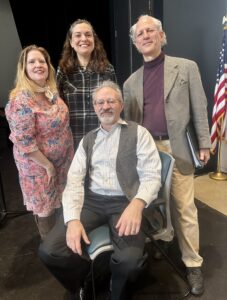
L-R standing: Cantors Lauren Adesnik, Sharon Hordes and David Lipp. Seated: Pianist Jeffrey Jamner (Photo by Andrew Adler)
By Andrew Adler
Community Editor
On Monday, April 17, the Trager Family JCC will join the rest of the world in observing Yom HaShoah – Holocaust Remembrance Day.
The hour-long ceremony begins at 6:30 p.m. and will unfold on the stage of the Shapira Foundation Auditorium, where, fittingly, CenterStage is mounting a production of The Diary of Anne Frank. Participants will include rabbis and cantors from several area synagogues, plus representatives of the community at large.
“There are facets of this remembrance that are the same from year to year,” says Jeffrey Jamner, a veteran Louisville pianist and educator who’s co-chairing this year’s event with Matt Golden, director of the Jewish Community Relations Council. Candles again will be lit – eleven of them, symbolizing the six million Jews who were murdered alongside an estimated five million others – in a ceremony introduced by Rabbi Beth Jacowitz Chottiner of Temple Shalom.
Rabbi Ben Freed of Keneseth Israel Congregation will recite Elie Wiesel’s adaptation of the Mourner’s Kaddish. Music will be played – perhaps most resonantly, three cantors singing I Never Saw Another Butterfly – referencing the compilation of children’s drawings and poems from the Nazis’ so-called “model” Czech concentration camp, Theresienstadt.
Cantor Lauren Adesnik of The Temple will chant the El Malei Rachamim in memory of community members who perished or survived the Shoah. Missing, however, will be a remnant of survivors who once graced local Yom HaShoah commemorations.
“It’s sad and inevitable,” Jamner acknowledged, “and it’s now falling on the shoulders of the second and third generations to keep the stories alive.”
The nomenclature, too, is evolving. Where “Holocaust” has been the standard word to describe the historical event, “Shoah” – Hebrew for “catastrophe” – is becoming increasingly prevalent.
It’s far from an arbitrary substitution.
“The subtext is important,” emphasizes Cantor David Lipp of Congregation Adath Jeshurun. “I don’t think most people don’t really understand what the word ‘holocaust’ means, but it’s a specific kind of a reading.” He cited a portion of the Book of Leviticus that details ritual sacrifice, in which an entire animal is consumed by flame as an offering to God.
“To the extent that one theologically understands the Holocaust, as a kind of martyrdom of the Jewish people to God…is fine,” Lipp says. “But I think most of us don’t see it that way. I also don’t think most people, when they say ‘Holocaust,’ think of that. It’s not the connotation of it, but the denotation of it. So for people who don’t buy into the theology, Shoah, which basically means ‘unmitigated catastrophe,’ is a better term.”
One person who could not escape the Shoah was Anne Frank. The Dutch teenager and her family, along with several others, took refuge in the secret annex of an Amsterdam commercial building from July 1942 until August 1944, when the Gestapo discovered their hiding place. Anne and her sister Margot eventually were transported to the Bergen-Belsen concentration camp, where both sisters died of typhus in the late winter of 1945.
The Trager Family JCC’s CenterStage deliberately planned its production of The Diary of Anne Frank to coincide with the Yom HaShoah commemoration.
Director Ariane Barrie-Stern is excited about her cast, comprising both teenage and adult actors. She also points out that that Anne’s diary is as much a coming-of-age testament as it is a catalog of depravation, which makes it (and the play) an ideal entry point for audiences of all backgrounds, not Jewish ones.
Anne’s diary entry that reads, “I still believe, in spite of everything, that people are truly good at heart,” is often held up as a testament to her spirit and hope. Yet she wrote it from the comparative sanctuary of her hiding place, before she was transported to Bergen-Belsen.
Musing about Anne’s predicament and ultimate demise, Lipp mentioned Dara Horn’s People Love Dead Jews – Reports from a Haunted Present, comprising a dozen essays touching on the peculiar emphasis on how Jews died, as opposed to how they live.
“It’s one of the best books I’ve read recently about Holocaust education and how it proceeds,” Lipp says. “One of the things she writes about is why Anne Frank and (Elie Wiesel’s death-camp memoir) Night are touchstones for the American understanding of the Holocaust. Because if you look at the subtext of Anne Frank’s ‘I still believe that people are good,’ it’s like, it makes people feel good about the fact that – as horrible as it was – it was a happy ending, right?”
But Horn, Lipp points out, suggests a very different perspective. “She asks what might (Frank) have written if she’d been able to bring her diary to Bergen-Belsen the day before she was exterminated? Might she have been a little angry? And if she had, would her diary be the touchstone of hell? Because as powerful as Anne Frank is, it’s important to wonder what she might have said after Bergen-Belsen, not before.”
“It’s important that we not forget that, Lipp adds. “We’re at the mercy of somebody who liked us last week, but this week, not so much. We should use our power taking care of ourselves, but also to take care of those we have the power to help. Both of those things can be aided by remembering – in a productive way, and in an honest way – what happened to us.”
The Jewish Federation of Louisville Yom HaShoah event takes place Monday, April 17 from 6:30-7:45 p.m. at the Trager Family JCC. To register, visit jewishlouisville.ejoinme.org/yomhashoah. The Yom HaShoah remembrance will also be livestreamed on YouTube — check back closer to the event date for the relevant link.



